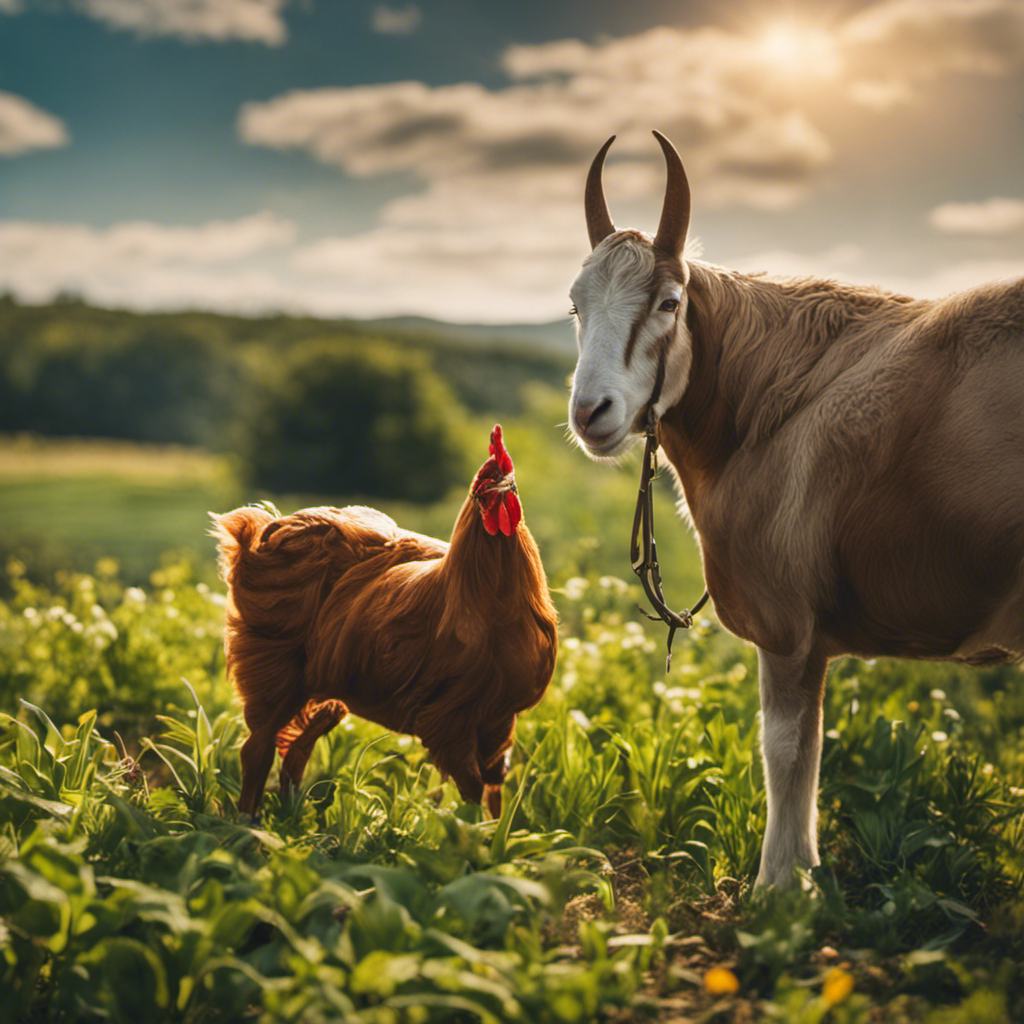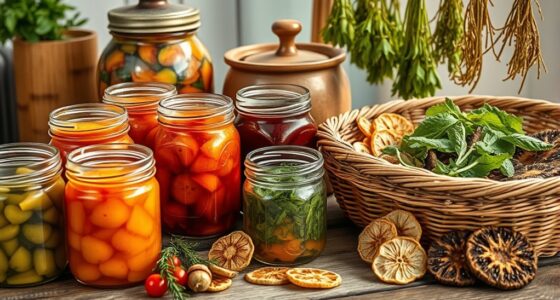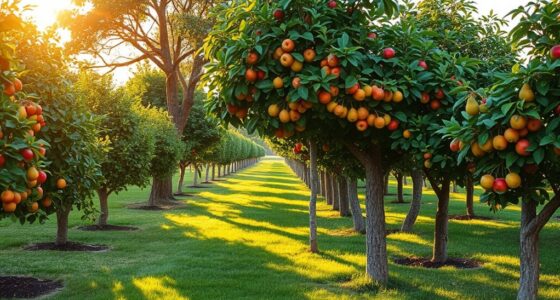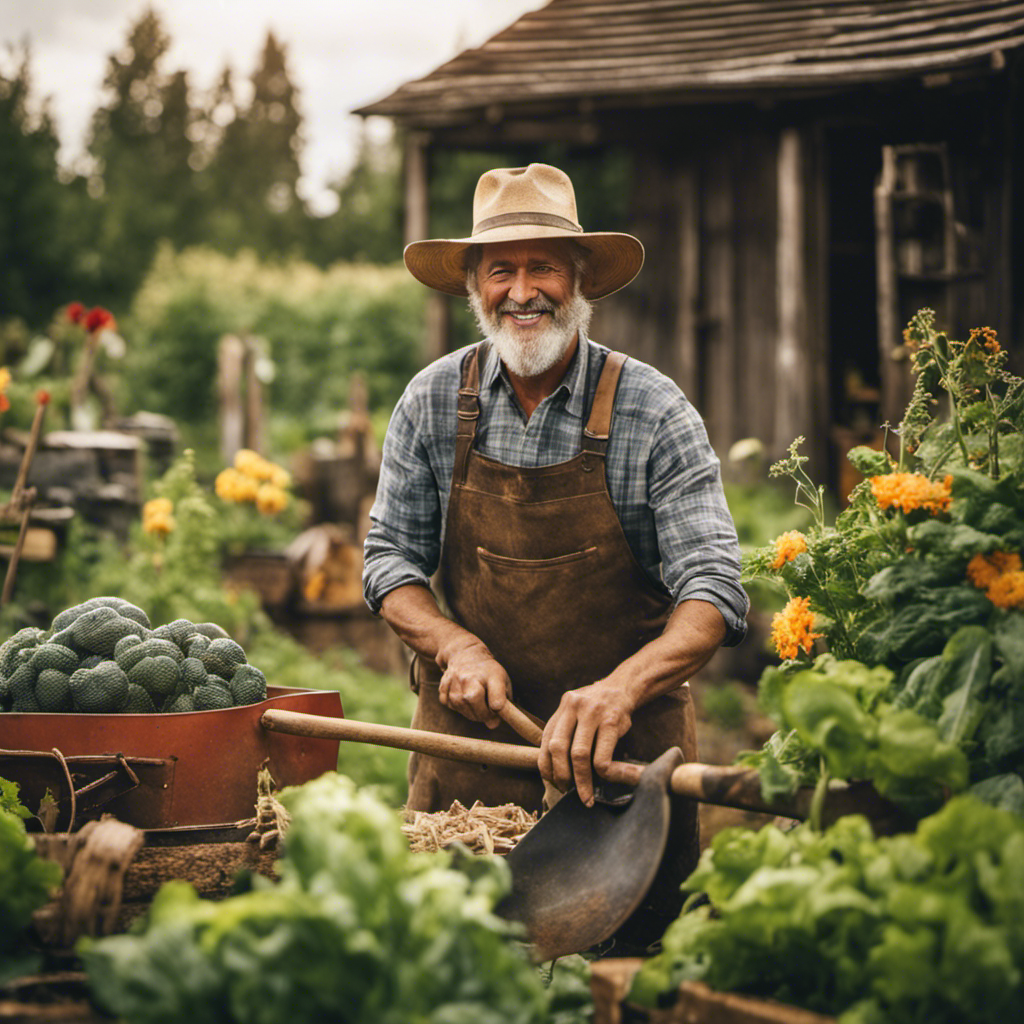Within the domain of homesteading, animals have a multitude of functions. They go beyond being merely cherished pets; they are a crucial component on our path to self-reliance. Providing us with meat and dairy, assisting with farming activities, and controlling pests, animals fulfill various roles on our homesteads.
They are the backbone, the workhorses, and the guardians that keep our homesteads thriving. In this article, we’ll delve into the various ways animals become integral parts of our homesteading journey.
Key Takeaways
- Animals on homesteads play crucial roles in meat production and dairy products, providing a natural diet, clean living conditions, and ample space to roam.
- Animals enhance farm productivity by providing labor, such as pulling plows and carrying heavy loads, and by contributing to soil fertility through manure production and composting.
- Animals serve as therapy animals, offering emotional support, companionship, and a sense of calm to individuals, promoting relaxation and improving overall well-being.
- Animals assist in pest control on homesteads, reducing the need for chemical insecticides and contributing to a pest-free environment.
Meat Production
We’re raising chickens for meat production on our homestead. As experienced homesteaders, we understand the importance of sustainable butchering and ethical consumption. We believe in giving our animals a high-quality life and ensuring their well-being until the end.
When it comes to raising chickens for meat, we focus on providing them with a natural diet, clean living conditions, and ample space to roam. This not only ensures their health but also contributes to the overall quality of the meat produced.
When it’s time for butchering, we approach it with respect and gratitude for the animal’s sacrifice. We use humane methods and carefully process the meat to minimize waste.
Dairy Products
Although we enjoy raising chickens for meat production, we also appreciate the versatility and nutritional value of dairy products on our homestead. Dairy alternatives have become increasingly popular in recent years, offering a variety of options for those who choose to avoid or can’t consume dairy.
However, we believe that there’s great value in having our own dairy animals, not only for the quality and freshness of the products but also for the overall well-being of the animals. Animal welfare is a top priority for us, and we take pride in providing our dairy animals with a comfortable and natural environment. We believe that by caring for them properly, we can ensure that they lead a healthy and fulfilling life.
Transitioning from discussing dairy products, let’s now explore the role of farming assistance on our homestead.
Farming Assistance
When it comes to farming assistance, animals play a vital role in enhancing farm productivity. From pulling plows to carrying heavy loads, animal labor benefits farmers in numerous ways.
Their strength, endurance, and innate abilities make them valuable partners in the agricultural industry.
Animal Labor Benefits
Let’s explore how animals can actively contribute to our farming endeavors and the benefits they bring to our homesteading lifestyle.
Animals not only serve as a source of food and materials, but they also play a crucial role in providing emotional support and animal therapy. On our homestead, we’ve found that the presence of animals can greatly improve our mental well-being and overall happiness.
Animals such as dogs, cats, and horses have been known to provide emotional support to individuals, especially those struggling with mental health issues. The bond between humans and animals is undeniable, and their companionship can bring comfort and reduce feelings of anxiety and stress.
Additionally, engaging in activities such as petting, grooming, or simply being in the presence of animals has been shown to have therapeutic effects, promoting relaxation and improving mood.
Including animals in our farming endeavors not only benefits us physically but also emotionally, creating a harmonious and fulfilling homesteading lifestyle.
Enhancing Farm Productivity
We have implemented various techniques to enhance farm productivity, such as utilizing advanced irrigation systems and implementing precision agriculture methods. These methods have allowed us to maximize crop yields while minimizing water usage and environmental impact.
Additionally, we’ve focused on genetic diversity in livestock to improve overall herd health and resilience. By selectively breeding animals with desirable traits, we can ensure a diverse gene pool that can better adapt to changing environmental conditions and resist diseases.
However, as we strive to enhance productivity, it’s crucial to prioritize animal welfare and ethics. We provide our animals with comfortable living conditions, access to clean water and nutritious food, and regular veterinary care. We also adhere to ethical practices, ensuring that our animals are treated with respect and compassion throughout their lives.
Manure Production
When it comes to homesteading, manure production plays a crucial role in sustaining our farm’s fertility. Animals provide us with a valuable resource – their waste – that can be utilized in multiple ways.
Firstly, it serves as a natural and nutrient-rich fertilizer, promoting the healthy growth of our plants.
Additionally, we can compost this waste, creating a sustainable method of soil enrichment that improves its overall quality.
Fertilizer Benefits Plants
Using manure as fertilizer enhances the growth and health of plants on our homestead. We’ve found that incorporating animal waste into our gardening practices has numerous benefits for our soil health and organic gardening endeavors. Here are three reasons why manure makes an excellent fertilizer:
- Nutrient-rich: Animal waste is packed with essential nutrients like nitrogen, phosphorus, and potassium. These nutrients are vital for plant growth and development.
- Soil conditioning: Manure helps improve the structure and texture of the soil. It increases its water-holding capacity, promotes better drainage, and enhances the soil’s ability to retain nutrients.
- Microbial activity: Animal waste introduces beneficial microorganisms to the soil. These microbes break down organic matter, release nutrients, and improve overall soil health.
By utilizing manure as a fertilizer, we not only provide our plants with the nutrients they need but also contribute to the long-term health and fertility of our soil.
Now, let’s delve into the next topic: composting with animal waste.
Composting With Animal Waste
To maximize the benefits of composting, we can mix animal waste with organic materials, such as kitchen scraps or yard trimmings, and incorporate them into our compost pile. Composting with animal waste is an excellent way to improve soil fertility and promote sustainable agriculture.
Animal waste, like manure, contains essential nutrients that can enhance plant growth and provide valuable organic matter to the soil. When mixed with other organic materials, it helps create a balanced and nutrient-rich compost.
Additionally, composting animal waste helps in waste management by reducing odor, preventing runoff, and minimizing the environmental impact of livestock operations. It’s important to note that proper handling and management of animal waste are crucial to prevent contamination and ensure the compost is safe for use.
Sustainable Soil Enrichment
We have found that incorporating a significant amount of manure into our soil has resulted in sustainable soil enrichment. This practice aligns with the principles of organic gardening and regenerative agriculture, promoting the health of our soil ecosystem.
Here are three key benefits we’ve observed:
- Enhanced nutrient availability: Manure contains essential nutrients like nitrogen, phosphorus, and potassium, which are gradually released into the soil, providing a steady supply of nourishment for plants.
- Improved soil structure: Manure improves soil structure by increasing its water-holding capacity and promoting the formation of stable aggregates. This allows for better root penetration and aeration, leading to healthier plant growth.
- Increased microbial activity: The introduction of manure into the soil stimulates the activity of beneficial microorganisms. These microbes break down organic matter, releasing nutrients and improving soil fertility.
Companionship
Let’s rely on our furry friends to brighten our days and provide us with companionship during these challenging times. Animals have long been recognized for their ability to provide emotional support and act as therapy animals for individuals in need. Whether it’s a therapy dog visiting a hospital or a cat providing comfort to its owner at home, the power of the human-animal bond can’t be underestimated.
These animals are trained to provide comfort, reduce anxiety, and improve overall well-being. Their presence alone can bring joy and a sense of calm to those who are struggling. In times of stress or loneliness, having a furry companion by our side can make a world of difference. They offer unconditional love, a listening ear, and a source of comfort that’s unmatched.
Let’s cherish and appreciate the companionship our furry friends provide, as they truly are our emotional support system.
Pest Control
One way our furry friends contribute to homesteading is by assisting us in pest control. Animals, especially those that are natural predators, play a vital role in keeping our homesteads free from pests.
Here are three ways they help us maintain a pest-free environment:
- Rodent Control: Cats are excellent hunters and can help keep the population of rodents, such as mice and rats, in check. Their natural predatory instincts make them effective at catching and eliminating these pests.
- Insect Control: Chickens are known for their love of insects, and they can be great allies in organic gardening. By allowing chickens to roam freely in the garden, they’ll feed on harmful insects, such as slugs, beetles, and caterpillars, thereby reducing the need for chemical insecticides.
- Wildlife Management: Dogs can help deter larger pests, such as raccoons and rabbits, from damaging crops. Their presence alone can act as a deterrent, making these animals think twice before venturing into our gardens.
Frequently Asked Questions
How Can Animals Be Used for Meat Production in Homesteading?
Animals can be used for meat production in homesteading, but it’s important to consider animal welfare and ethical considerations. Our experience has taught us to prioritize humane practices and ensure the well-being of the animals we raise.
What Are Some Common Dairy Products That Can Be Produced on a Homestead?
Cheese making and yogurt production are common dairy products that can be produced on a homestead. We have experience in these areas and can provide knowledgeable guidance on how to incorporate them into your homesteading practices.
How Can Animals Assist in Farming Activities on a Homestead?
Animals play a crucial role in our homesteading journey. From powering agriculture with their strength to providing manure for nutrient-rich soil, their contributions are invaluable. Utilizing their skills brings numerous benefits to our farming activities.
What Role Does Manure Production Play in Successful Homesteading?
Manure production is crucial for successful homesteading. It plays a vital role in maintaining soil fertility by providing essential nutrients. Proper manure management ensures that the soil remains healthy, promoting the growth of crops and overall sustainability.
How Can Animals Provide Companionship in a Homesteading Environment?
Animals play a crucial role in providing companionship on the homestead. They offer emotional support and can even serve as a form of animal therapy. Their presence adds a sense of comfort and connection to the homesteading environment.
Conclusion
In conclusion, animals play multifaceted roles in homesteading. They provide not only meat and dairy products but also valuable assistance in farming tasks. Their manure production contributes to the fertility of the land, while their companionship brings joy and emotional support to homesteaders.
Additionally, animals serve as natural pest controllers, helping to maintain a healthy and balanced ecosystem. An interesting statistic reveals that on average, one dairy cow can produce over 2,000 gallons of milk in a year, highlighting the significant contribution of animals to homesteading practices.










